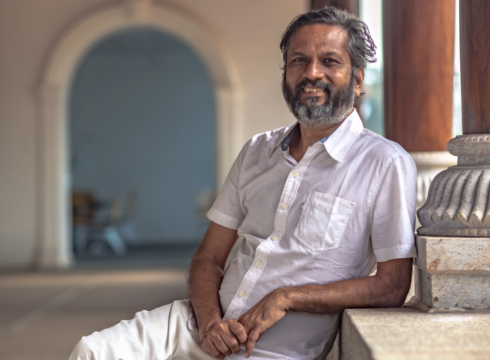Adopting new technologies without appropriate safeguards could cause unprecedented disruption of the existing social order: Sridhar Vembu
It is imperative for India to frame rules regarding future development of Al so that it does not cross ethical thresholds, said Zoho’s boss
Vembu has said that there is a need to place strict impetus on the openness of AI to ensure that no one monopolises it
Inc42 Daily Brief
Stay Ahead With Daily News & Analysis on India’s Tech & Startup Economy
Zoho cofounder and ace entrepreneur Sridhar Vembu has joined the growing chorus for building a consensus on regulation and effective utilisation of artificial intelligence (AI).
In an open letter written by Vembu, which was co-signed by former NITI Aayog vice-chairman Rajiv Kumar and cofounder of iSPIRIT Foundation Sharad Sharma, the Zoho CEO appealed to the country’s policymakers, academicians and other stakeholders to debate the impact of AI on India.
“… we urge all stakeholders… to join this vital debate that will help evolve a national consensus on how best to utilise this powerful technology for achieving our national goals and meeting the exploding aspirations of our young population,” the open letter read.
Noting that AI could put millions of jobs at risk overnight, Vembu said that adopting new technologies such as AI, without appropriate safeguards could cause ‘unprecedented disruption of the existing social order’.
Terming AI as brimming with transformational potential, Vembu, in his letter, added that the emerging tech could also be the ‘harbinger of chaotic and potentially catastrophic consequences for humanity’.
He noted that it was imperative for India and the global community to ‘agree upon’ and frame rules regarding the future development of Al that do not cross ethical thresholds.
Taking to Twitter afterwards, Vembu called on placing strict openness requirements on AI technology. He also called on the Union government to crack the whip on companies trying to monopolise the emerging space, adding that there should be no monopolies and no toll gates.
“What should our policymakers do? My advice is to place strict openness requirements on AI technology. Some providers will threaten to leave India but we must call their bluff. Indians can produce great AI too, subject to our laws. No monopolies, no toll gates! ?,” the Zoho cofounder tweeted.
Lashing out at prospective tech monopolies, Vembu said that it was imperative upon public policy to ensure that no one monopolises AI.
Posing a question, Vembu said that in a world where AI has eliminated all jobs and can produce goods without human intervention, how does one pay for the goods because there are no jobs and hence no income. He further warned that this could open the world to prospective monopolies that could extract rent.
“The air we breathe is free and we don’t complain about it, so if a future magical AI were to produce all the goods and services free of human labour, it need not be bad for us. The real question is “how do we pay for those goods, because there are no jobs and hence no income”…. That question really comes down to “who owns the magical AI” – are there monopolies that extract rent?” Vembu tweeted.
While noting that deployment of AI could help India jump the traditional linear paths of growth, Vembu also noted, in his open letter, that Al was ‘inveigling’ itself into the economic, psychosocial, and cultural aspects of human life at an unprecedented speed.
“The downstream effects of adopting technologies such as Al without essential due diligence and appropriate safeguards can cause unprecedented disruption of the existing social order… we have to manage it carefully to avoid unmanageable socio-economic disruptions at scale,” he added.
Citing a Goldman Sachs report, Vembu claimed that an estimated 300 Mn jobs were at risk worldwide. He also added that the rapid growth of generative AI platforms such as ChatGPT and GPT-4 were posing a particular threat to programmers.
Citing his own experience, Vembu said that he has, in the past 4-5 years, also internally flagged concerns that generative AI platforms, in development currently, would first impact the jobs of many programmers.
This comes hours after it was also reported that the three authors of the open letter had submitted a proposal to the Centre to establish an AI policy to govern the space.
Warning Bells Across The Globe
The Zoho CEO joins the growing clamour for stricter regulation of emerging AI technologies. Late last month, tech experts, from across the globe, banded together to urge AI labs to ‘immediately pause’ their work on technologies stronger than GPT-4 for at least six months.
In an open letter, the experts urged for regulation of AI technologies citing ‘profound risks’ to society and humanity. Such was the support for the move that it was signed by big names in the tech world, including the CEO of Tesla and Twitter Elon Musk, tech giant Apple cofounder Stever Wozniak, and many researchers and developers.
The letter also noted that such AI systems were close to reaching a level of intelligence at which they could compete or even ‘replace’ humans. Lashing out at tech giants, the letter stated that these companies were participating in ‘an out-of-control race’ to deploy AI systems which even their creators could not predict or reliably control.
Just like Vembu, the open letter called on the AI developers to undertake a 6-month long ‘AI summer’ to establish safety protocols. In the event such a pause is not established, the letter called for government intervention and urged policymakers to institute liability measures for any purported harm caused by AI. It also sought funding for AI safety research and to develop a certification system for all upcoming AI systems.
Note: We at Inc42 take our ethics very seriously. More information about it can be found here.


